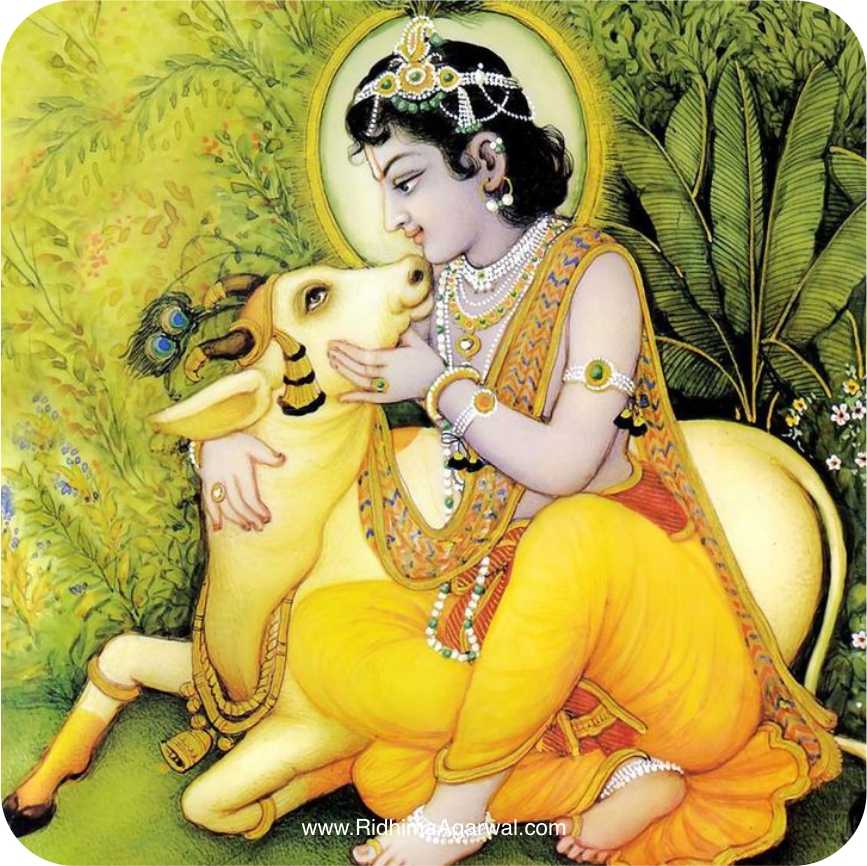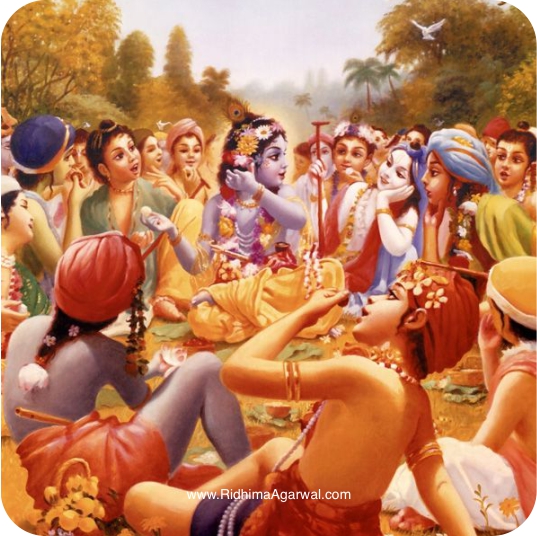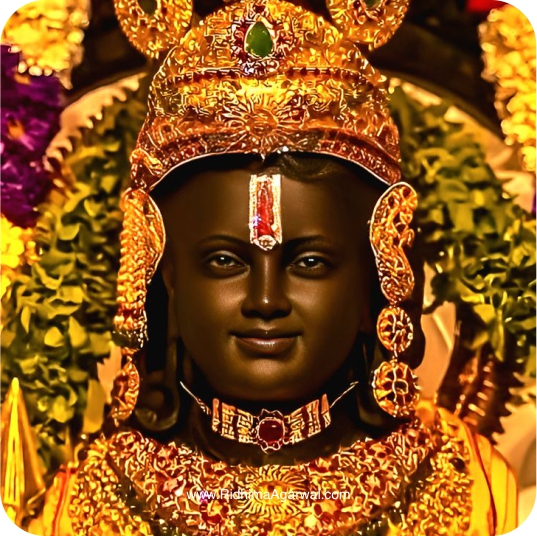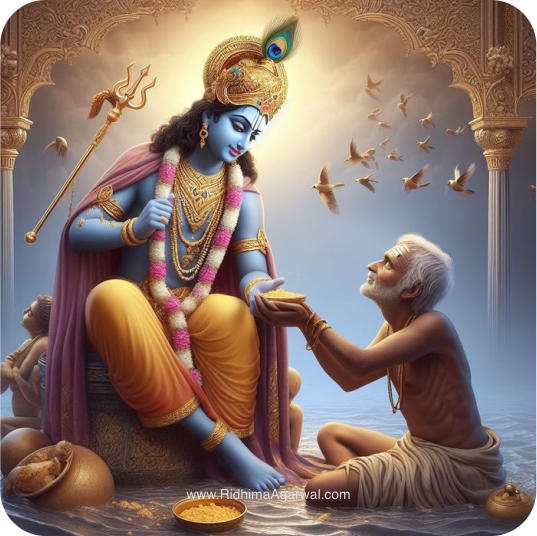Devshayani Ekadashi - 17 July 2024
Story, Spiritual Significance, Fasting Schedule, and Parana Time

Devshayani Ekadashi 2024 : Date and Time
Ashadha, Shukla Paksh Ekadashi
Ekadashi tithi begins : July 16, 2024 – 8:33 PM (IST)
Ekadashi tithi ends : July 17, 2024 – 9:02 PM (IST)
Parana Time : July 18, 2024 – 5:17 AM – 7:56 AM (IST)
Dwadashi ending time : July 18, 2024 – 8:44 AM (IST)
Devshayani Ekadashi Story (Katha)
Yudhishthira asked—Vasudeva, what is the name of the Ekadashi in the Krishna Paksha of Ashadha? Please describe it in detail.
Lord Krishna replied—Great King, the Ekadashi in the Krishna Paksha of Ashadha is called ‘Yogini’. It is known for destroying great sins. For those drowning in the ocean of worldly existence, it is like an eternal boat. This vrat (fast) is considered the essence of all rituals in the three worlds.
In the city of Alakapuri, King of Kings Kubera resided, who was always dedicated to the devotion of Lord Shiva. His servant, a Yaksha named Hemamali, used to bring flowers for worship. Hemamali’s wife was a beautiful woman named Vishalakshi. He was so captivated by her that he spent all his time with her. One day, Hemamali brought flowers from the Manasarovar but stayed at home, engrossed in his wife’s love, and did not go to Kubera’s palace. Meanwhile, Kubera, seated in the temple, was performing the worship of Shiva and waited until noon for the flowers. When the time for worship passed, the enraged Yaksha King asked his servants, ‘Yakshas, why has the wicked Hemamali not arrived? Find out the reason for his absence.’
The Yakshas said—King, he is absorbed in the pleasures of his wife and is indulging in his desires at home.
Hearing this, Kubera was filled with anger and immediately summoned Hemamali. Realizing he was late, Hemamali’s eyes were filled with fear. He came and stood before Kubera, whose eyes turned red with rage upon seeing him. Kubera said—’O sinner! O wicked and immoral one! You have neglected the Lord, and hence, you shall be afflicted with leprosy and separated from your beloved wife. You are banished from this place.’
Upon Kubera’s command, Hemamali was cast out. He was filled with great sorrow, and his entire body was afflicted with leprosy. However, due to the effect of Shiva’s worship, he did not lose his memory. Despite being burdened with sins, he remembered his past actions. Wandering here and there, he reached the peaks of the great Mount Meru. There, he encountered the great sage Markandeya engaged in penance. The sinful Yaksha bowed to the sage’s feet from a distance. Seeing him trembling with fear, the compassionate sage called him closer and asked—’How did you become afflicted with leprosy? Why do you appear so wretched?’
The Yaksha said—’O Sage! I am a servant of Kubera. My name is Hemamali. Every day, I used to bring flowers from Mansarovar and give them to Kubera for Shiva’s worship. One day, caught up in the pleasures with my wife, I lost track of time, and as a result, the king of kings, Kubera, cursed me. Thus, I am afflicted with leprosy and separated from my beloved. O great sage, due to some good karma, I have come near you. Knowing that saints naturally have a compassionate heart, please instruct me on my duty.’
Markandeya replied—’You have spoken the truth and not lied; therefore, I will instruct you in a virtuous vow. Observe the ‘Yogini’ Ekadashi fast, which falls in the Krishna Paksha of Ashadha. The merit of this fast will certainly cure your leprosy.’
Lord Shri Krishna says—Hearing the sage’s words, Hemamali fell at the sage’s feet like a stick. The sage lifted him up, bringing great joy to Hemamali. Following Markandeya’s advice, Hemamali observed the Yogini Ekadashi fast, which cured his leprosy. By performing this excellent fast as instructed by the sage, he became completely happy. Such is the greatness of the Yogini Ekadashi fast. The merit gained by feeding eighty-eight thousand Brahmins is equal to the merit of observing the Yogini Ekadashi fast. “Yogini” is a fast that pacifies great sins and bestows immense virtue. Reading and listening to its story frees a person from all sins.
Yudhishthira asked— “Bhagavan, what is the name and method of the Ekadashi that falls in the Shukla Paksha of Ashadha? Please kindly explain.”
Lord Shri Krishna replied— “O King, the Ekadashi in the Shukla Paksha of Ashadha is known as ‘Shayani’. I shall describe it. It is a highly meritorious fast, bestowing heaven and moksha, removing all sins, and is considered an excellent vow. On the day of Shayani Ekadashi in Ashadha Shukla Paksha, those who worship Lord Vishnu with lotus flowers and observe the Ekadashi fast have worshiped the three worlds and the three eternal gods. On Shayani Ekadashi, one form of mine resides with King Bali, and the other form rests on Shesha Naga in the Ksheer Sagar until the next Ekadashi in Kartik. Therefore, from Ashadha Shukla Ekadashi to Kartik Shukla Ekadashi, one should follow Dharma diligently. The one who observes this vow attains the highest destination. Therefore, this Ekadashi should be observed with great care. On the night of Ekadashi, one should remain awake and worship Lord Vishnu, who bears the conch, discus, and mace, with devotion. Even Lord Brahma with four faces is unable to measure the merit of such a person. O King, those who observe this highly meritorious Ekadashi vow that grants both enjoyment and liberation and removes all sins are dear to me, even if they belong to a low caste.
Those who spend the Chaturmas period offering lamp donations, eating on Palasha leaves, and observing vows are dear to me. During Chaturmas, Lord Vishnu sleeps; hence one should sleep on the ground. In the month of Shravan, avoid leafy vegetables; in Bhadrapada, avoid yogurt; in Ashwin, avoid milk; and in Kartik, avoid pulses. Observing celibacy during Chaturmas leads to the highest destination. O King, observing the Ekadashi fast frees one from all sins; therefore, one should always observe this vow without fail. The Ekadashis of Krishna Paksha between ‘Shayani’ and ‘Bodhini’ are suitable for householders to observe. Other Krishna Paksha Ekadashis of other months are not suitable for householders, but all Shukla Paksha Ekadashis should be observed.”
Spiritual Significance of Devshayani Ekadashi
The spiritual significance of Devshayani Ekadashi is deeply rooted in the symbolism of Lord Vishnu’s sleep and awakening. It represents the cyclical nature of life, death, and rebirth, reminding devotees of the importance of introspection, renewal, and spiritual awakening. During this period, devotees engage in rigorous spiritual practices, including fasting, meditation, and reading sacred texts, which are believed to purify the mind and soul. Observing the fast of Devshayani Ekadashi is said to bestow immense spiritual benefits, such as the removal of sins, attainment of moksha (liberation), and the favor of Lord Vishnu.
Fasting on Devshayani Ekadashi is not merely an act of physical abstention from food but is a comprehensive spiritual discipline that includes abstaining from negative thoughts and actions, and focusing on devotion and piety. Devotees believe that by observing this fast with sincere devotion and faith, they can attain the grace of Lord Vishnu, who forgives their past sins and grants them spiritual upliftment. The rituals include worshiping Lord Vishnu with flowers, incense, and chanting of mantras, particularly the Vishnu Sahasranama (the thousand names of Vishnu), which are believed to invoke his blessings.
In essence, Devshayani Ekadashi is a powerful reminder of the transient nature of life and the eternal nature of the soul. It encourages devotees to embark on a journey of self-discovery, inner peace, and spiritual growth, ultimately leading to union with the divine consciousness. Through the observance of this sacred day, devotees seek to align their lives with the divine order, fostering a deeper connection with the supreme being, Lord Vishnu.
Follow to Stay Connected
More For You
-
 Kamika Ekadashi 31 Jul 2024 : Story, Spiritual Significance, Fasting Schedule, and Parana Time
Kamika Ekadashi 31 Jul 2024 : Story, Spiritual Significance, Fasting Schedule, and Parana Time -
 Amalaki Ekadashi 19 Feb 2024 : Story, Spiritual Significance, Fasting Schedule, and Parana Time
Amalaki Ekadashi 19 Feb 2024 : Story, Spiritual Significance, Fasting Schedule, and Parana Time -
 Vijaya Ekadashi 19 Feb 2024 : Story, Spiritual Significance, Fasting Schedule, and Parana Time
Vijaya Ekadashi 19 Feb 2024 : Story, Spiritual Significance, Fasting Schedule, and Parana Time -
 Jaya Ekadashi 19 Feb 2024 : Story, Spiritual Significance, Fasting Schedule, and Parana Time
Jaya Ekadashi 19 Feb 2024 : Story, Spiritual Significance, Fasting Schedule, and Parana Time -
 Shattila Ekadashi 6 Feb 2024 : Story, Spiritual Significance, Fasting Schedule, and Parana Time
Shattila Ekadashi 6 Feb 2024 : Story, Spiritual Significance, Fasting Schedule, and Parana Time